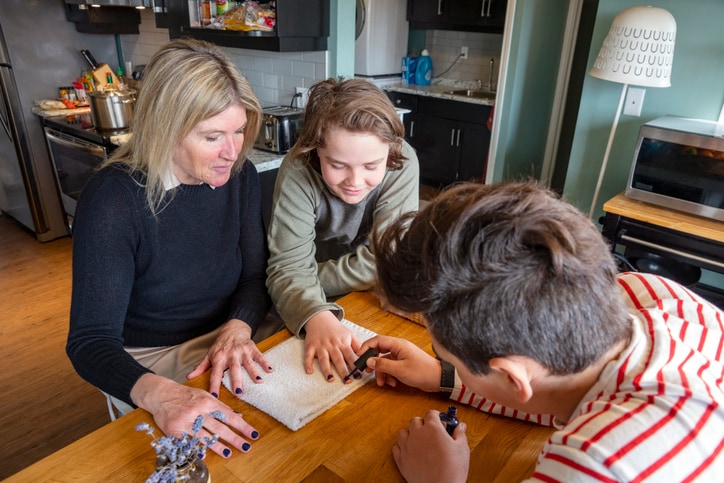We all know that preschool is a whole lot more than macaroni paintings and Playdoh sculptures. And preschool parent-teacher conferences are an excellent opportunity for you to collaborate with your child’s teacher to create an at-home action plan that will support her learning. It’s also a chance to get more insight into her burgeoning abilities, as well as any areas where she could benefit from additional guidance.
But, in order to get the most out of these meetings, you’ll need to ask the right kinds of questions…and identifying exactly what those are can be a real challenge. To help you navigate this situation, we asked eight professors — whose specialties include human development, education and behavioral sciences — what questions parents should ask to get the most out of preschool parent-teacher conferences.
1) How Would You Describe My Child?
“Beginning with a general, open-ended question allows, and encourages, the teacher to provide an overarching profile of your child as a learner and individual. It also gives you a good sense of what the teacher believes is most important to address. You can then follow up with related, specific, questions which probe for more details about your child, and where you should focus.”
– Loren Marulis, Ph.D., assistant professor of human development, Connecticut College
2) How Are You Helping My Child Develop Self-Regulation Skills?
“Self-regulation is an important social-emotional skill, for kids to learn in preschool. Self-regulation includes emotional regulation, cognitive regulation, and physical regulation. If children learn to regulate their behavior early on, they can focus more readily on acquiring academics when they reach elementary school.”
– Lisa M. Lopez, Ph.D., associate professor of educational psychology, University of South Florida
3) How Is My Child’s Time Spent Between Assignments?
“As an education professor and a parent, I’m interested in getting a sense of what the children are expected to do when they are done with in-class assignments. I do not want my child to sit idly in class, waiting for other children to complete their work, so I’d like to know how they are being challenged beyond the regular curriculum, either through independent, or group projects.”
– Denise Farrelly, M.S.Ed., lecturer in the Department of Behavioral Sciences and Human Services, Kingsborough Community College, City University of New York
4) What Are Your Learning Goals for My Child?
“I advise teachers to describe three important things to parents. And if teachers don’t describe them, then parents should always ask. First, what are the academic learning goals? In other words, what do you want my child to learn and accomplish by the end of the term. Second, how are students expected to demonstrate that learning. And third, how can we help at home?”
– Thomas R. Guskey, Ph.D., professor of educational psychology, University of Kentucky
5) What Reading Materials Are in Your Classroom?
“My area of focus is literacy. It is vitally important that children at the preschool level are engaged, and acquire a love of reading. Parents should ask their child’s teacher what is being read in the classroom, and how the teacher promotes project-based, literacy development. I support the concept that CRP (culturally relevant pedagogy) is CPR for children. If kids can see themselves mirrored in what they read, it can breathe life into academics, and foster love of education. Ask the teacher if the classroom includes books that reflect the interests, heritage, and values of your child.”
– Dr. Eddie M. Connor, Jr., professor of English, Marygrove College
6) What Open-Ended Questions Do You Ask to Encourage Creativity?
“My wife teaches preschool, and I love hearing stories she brings home, where students have asked a great question that shows an element of creativity, or when they’ve put two ideas together for the first time, and shared it with others. One day, the students were trying to guess what objects would float in water, and what objects would sink. They put an object in water that would float for a while, then sink, then float again. My wife asked the children what they should call this. One student eagerly responded “It floats and sinks, so it flinks!” (I can’t wait to teach that child in college!) Ask what your child’s teacher does to nurture, encourage, and delight in the presence of creativity in the classroom. A pre-school curriculum includes more academic components than ever before, which can lead to lots of memorization of basic ideas. That’s important, but putting the ideas to use by drawing stories and experiences from students, makes those ideas more real and personal for children. I’d want to know how my child’s teacher gets beyond one-word answers, so my child can personalize what’s being learned at school, and apply it to their world.”
– Patrick O’Connor, social science department chair, Oakland Community College, and associate dean of college counseling, Cranbrook Schools
7) What Learning Activities Does My Child Get Most Excited About?
“Children are naturally curious; they have an innate desire to learn, that parents and teachers should work together to nurture. All too often, however, children are ‘taught out’ of their curiosity. They come to believe that learning is boring and tedious, because they are required in formal settings to adhere to a fixed curriculum, and have little opportunity to exercise personal choice, in their own learning. As parents, we have much more freedom in what and how we teach our children than teachers have, so we can provide supplemental learning experiences to them that focus on what they’re most passionate about, without worrying whether or not we are meeting a set of one-size-fits-all standards. Teachers have to operate within a set of requirements and expectations that prevent them in many ways, from fully exploring each child’s learning interests. Teachers can, however, help parents identify what those passions are, so that parents can take the next step in nurturing their child’s curiosity through family activities.”
– Royce Kimmons, Ph.D., assistant professor of instructional psychology & technology, Brigham Young University, David O. McKay School of Education
8) How Can We Support the Work of the Classroom at Home
“Taking a team approach can yield better results than solely focusing on only what the teacher should be doing. Look at what everyone can do to build on the efforts of each other. That mindset invites melding what is working at home, with what is working at school. The teacher may not be aware of the child’s activities outside of school. At a parent-teacher conference, parents have the opportunity to provide insights into the child’s likes and dislikes, and the teacher has the opportunity to discuss trends they observe in the child’s behavior, as well as their interests and talents. Working together, you can best determine how to leverage your efforts on your child’s behalf.”
– Amon Millner, assistant professor of computing and innovation, Olin College of Engineering
Corey Whelan is a freelance writer in New York. Follow her on Twitter






